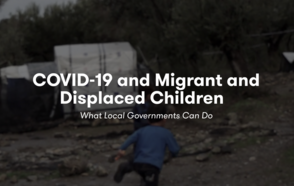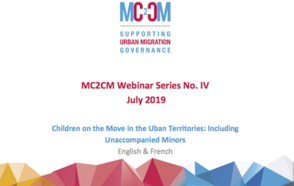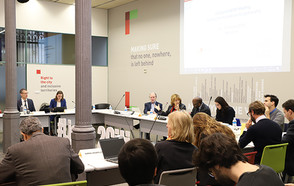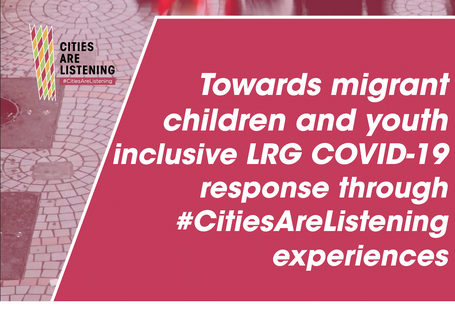
The #CitiesAreListening mandate is to transcend from social distance to a world driven by communities. As a step to deliver the Pact for the Future that UCLG is developing, in partnership with communities, the #CitiesAreListening on “COVID-19 Response and Recovery for Migrant and Displaced Children and Youth” brought about the perspectives, the needs and the contributions of a community that is gradually becoming an integral part of local response and recovery efforts to COVID-19 impacts - young people on the move.
On Monday, 30th of November, this experience took place in the form of a dialogue between mayors and youth delegates about what local and regional governments can do – and are doing – to make sure that migrant and displaced children and their families are included in preparedness, response and recovery from the ongoing COVID-19 pandemic. The session was co-organised by UCLG, Metropolis and UN-Habitat in partnership with UNICEF and the Mediterranean City to City Migration (MC2CM) project.
Opened by Emilia Saiz, the Secretary General of UCLG, the #CitiesAreListening experience began with an introductory panel on migrant children and youth contributions in the ongoing COVID-19 local responses and their urgent needs, comprising of Mayor of Polokwane and Co-President of UCLG Thembisile Nkadimeng , Chief of Urban Practices at UN-Habitat Shipra Narang Suri, youth delegate Ahmed Karimi from United Nations Major Group for Children and Youth (UNMGCY) and policy specialist Laura Healy from UNICEF, who presented the new UNICEF resource package on COVID-19 and migrant and displaced children.
“Equality is at the heart of the recovery. We need to put special attention to how the pandemic is affecting people on the move - particularly children and girls, ensuring that their rights are recognised, especially when they also belong to populations that have been historically discriminated against.” Thembisile Nkadimeng, Mayor of Polokwane and Co-President of UCLG.
“Young people on the move, can also play a crucial role as they can bridge the technological gap for their entire families.” Ahmed Karimi, youth delegate, UNGMCY.
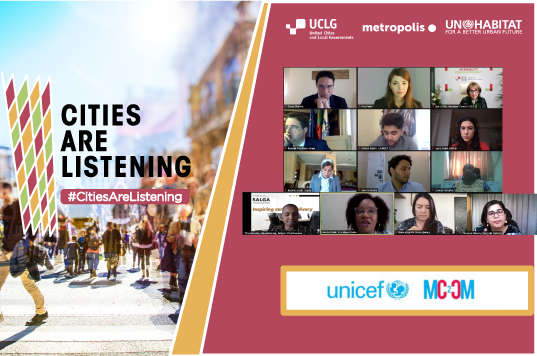 These introductory statements were followed by a panel of mayors highlighting ongoing city level practices on inclusive COVID-19 response and recovery for migrant and displaced children and youth. Among those, participants highlighted the importance of putting a stop to child labour, with Tehran and Quito laying out the steps undertaken in their cities to reverse this issue and set regulations to protect children.
These introductory statements were followed by a panel of mayors highlighting ongoing city level practices on inclusive COVID-19 response and recovery for migrant and displaced children and youth. Among those, participants highlighted the importance of putting a stop to child labour, with Tehran and Quito laying out the steps undertaken in their cities to reverse this issue and set regulations to protect children.
Gissela Chalá, Deputy Mayor of Quito, explained how the existing national framework assists the rights of young people in Quito and highlighted the relevance of legal arrangements committed to effectively providing and integrated approach to gradually eradicating child labour.
Dr. Javadi Yeganeh, Deputy Mayor for Social and Cultural Affairs from Tehran Municipality, highlighted the progress made by Tehran, as a UNICEF Child Friendly Cities Initiative (CFCI) pilot city towards providing educational services to immigrant children and the crucial role played by them and their families in supporting the municipality's COVID-19 response efforts.
Fongu Cletus Tanwe, Mayor of Bamenda, shared a diversity of municipal efforts to enroll migrant children back in school by subsidising school fees and educational material costs.
The third segment of the session engaged local representatives and youth delegates from the United Nations Major Group of Children and Youth (UNMGCY) in a forward looking discussion on how cities can step up for children on the move in the context of COVID-19.
Macoura Dao, Mayor of Foumbolo and President of REFELA, reminded how children particularly suffer the impact of COVID-19 and called for mobilisation around the REFELA Campaign to protect children living in the streets in African cities.
Ricardo Rio, Mayor of Braga recalled the need of strengthening connections among municipalities and youth associations, asserting social responsibility from youngsters as a key step towards short term emergency responses, addressing linguistic barriers and migrants inclusion and social cohesion in the city.
This argument was further highlighted by Johnny Pereira, UNMGCY youth delegate, who spoke about the importance of coordinated activities between local CSOs and grassroots organisations and international organizations such as UNHCR and UNICEF towards migrant integration, particularly in fragmented host societies.
Rachida Saadi, Head of Cooperation and External Relations, Oujda, spotlighted the contribution of international cooperation and city-to-city partnership projects such as the MC2CM project, towards the compilation of a comprehensive migrant database in Oujda, which would allow the municipality to efficiently identify key actors in migration governance activities, including migrant children and youth through a multi-stakeholder approach.
Trang Vu, UNMGCY youth delegate, shed light on the importance of migrant youth contributing through informal networks and local NGOs as catalysts in bridging the gap to information and healthcare services for migrant communities during the pandemic.
Building trust between migrant communities and the LRGs and ensuring continued migrant access to essential local public services, with an emphasis on child protection services, emerged as key priorities through the session. Mayors acknowledged the urgent need for shifting the narrative to ensure that migrants are seen as resourceful human capital for local development. The youth representatives reminded us that young people on the move have been playing a crucial role in bridging the digital divide and information gap for their entire families and migrant communities in the light of COVID-19 restrictions. Migrant youth have become beacons of information and cultural mediation for their communities.
Emilia Saiz concluded this collective reflection commending the progress made in this conversation as a first step towards developing a new social contract based on agenda 2030 principles and a new Pact for the Future. Mainstreaming the needs of migrant youth and children in migration policy and renewing trust by all communities on local and regional governments were mentioned as cornerstones to ensure health, safety, and protection for all, and in particular for those most vulnerable.
“Societies and Local governments as the level of government closest to society have a key role in protecting children, including migrant children. Basic service provision is very critical for this and this session has identified concrete interventions targeted at service provision for child protection that can actually make a difference. This pandemic has allowed us to ponder differently about what is essential, and what is not. And we certainly think that addressing the needs of migrant children will be very critical in the future.” Emilia Saiz, UCLG Secretary-General
Key policy recommendations:
Enhancing access to basic services
- Include migrant and displaced children in preparedness, response and mitigation efforts for COVID-19, particularly by enhancing access to basic services.
- Strengthen public service provision, including healthcare, WASH, social protection and child protection, to ensure migrant and displaced families have access to basic services
- Establish firewalls between local service providers and immigration authorities, so undocumented families are not discouraged from using services for fear of being detected. Remove identification requirements that restrict access to services.
- Acknowledge child protection services as essential basic services, and work to eradicate child labour and improve the conditions of underage workers
Strengthening trust and participation
- Prioritize building trust between public institutions and young migrant and displaced people and their communities to help foster inclusion at local level.
- Ensure public decision and policy making includes the perspectives of children and youth on the move by fostering bolder and more inclusive mechanisms of participation.
- Establishing youth councils comprising young people from different communities and organizations in order to ensure continuous and substantial advice, consultation and cooperation on urban governance
Promoting communication and fair narratives
- Enhance communication between migrant and displaced children and youth and their host communities to foster inclusion, counter disinformation and build bridges among communities
- Implement education strategies for continued learning for all children - including those who are migrants or displaced – and make schools safe, healthy, and inclusive environments COVID-19 to children and families on the move.
Bridging cultural and digital gaps
- Leverage and promote the role of children and youth as key partners in combatting disinformation and supporting inclusion of migrant and displaced people in urban policies – many migrant and displaced youth are already acting as cultural interpreters for their families and communities
- Recognize migrant children and youth as key partners to help bridge the digital divide, accelerating progress, innovation and reducing inequalities in their communities
Next steps:
UCLG remains committed to driving this agenda forward at the global level, counting on the support of UNICEF, to help equip cities and regions in the world with the tools, resources and arguments they need to include, protect and empower every migrant and displaced child and young person. At the same time, UNICEF provides unique opportunities to showcase the critical role and work of local and regional governments championing the rights of migrant and displaced children and youth – listening to them, working with them and helping foster their potential. Building on these discussions, UCLG and UNICEF are exploring the development of a joint toolkit and convening several capacity building sessions to support LRGs to include migrant and displaced children and youth as they respond and recover to COVID-19.
- COVID-19 and Migrant and Displaced Children – What Local Governments Can Do
- Quick Guidance for frontline workers helping children affected by migration during COVID-19
- Practical Guidance for Risk Communication and Community Engagement (RCCE) for Refugees, Internally Displaced Persons (IDPs), Migrants, and Host Communities
- UNICEF Practical Tips on Engaging Adolescents and Youth in the COVID-19 Response
- UCLG Beyond the Outbreak Platform: Live Learning Experience on Migration
- MC2CM Webinar Report: Children on the Move - Including Unaccompanied Minors (UCLG-CSIPD, UNICEF, UCLG)











